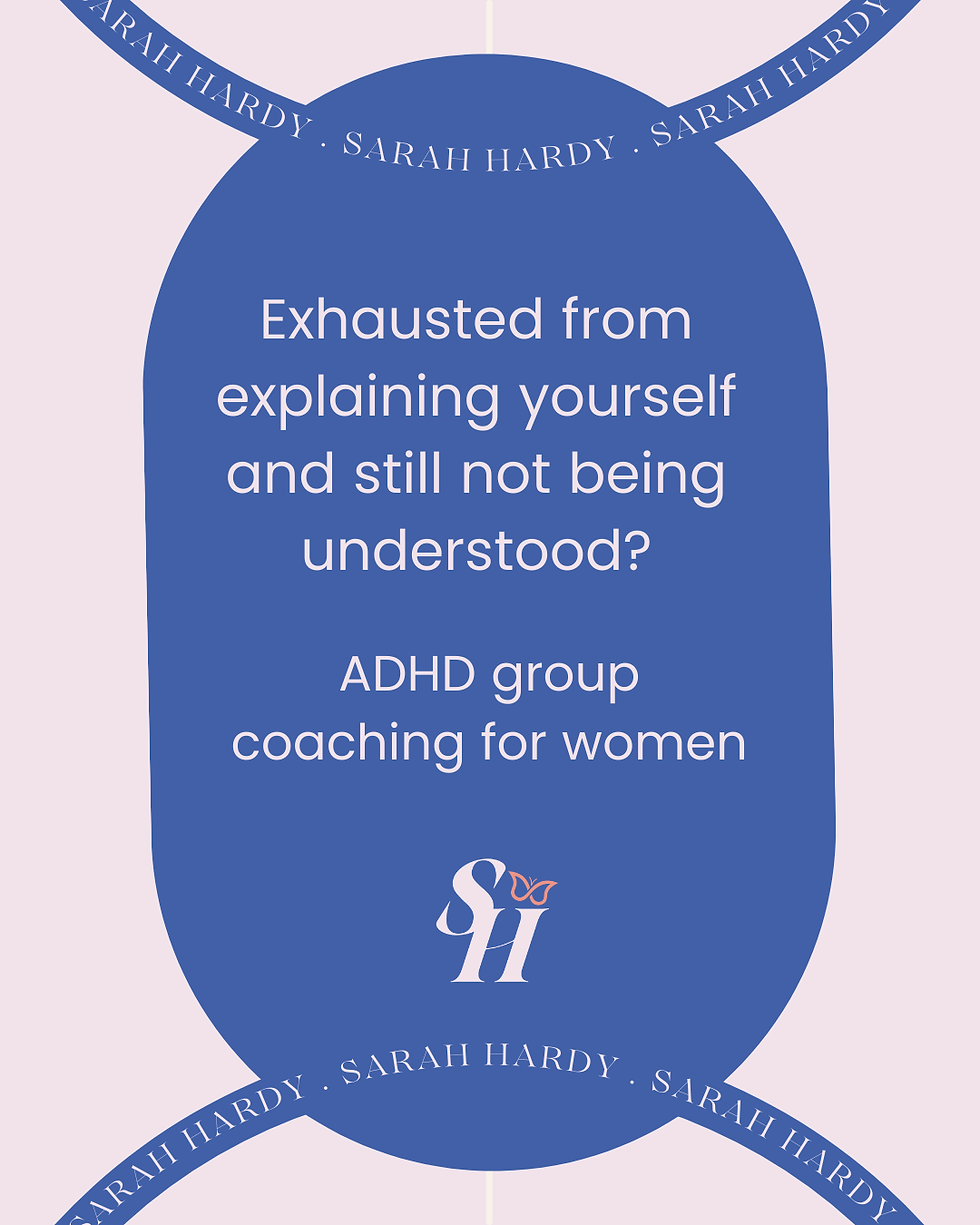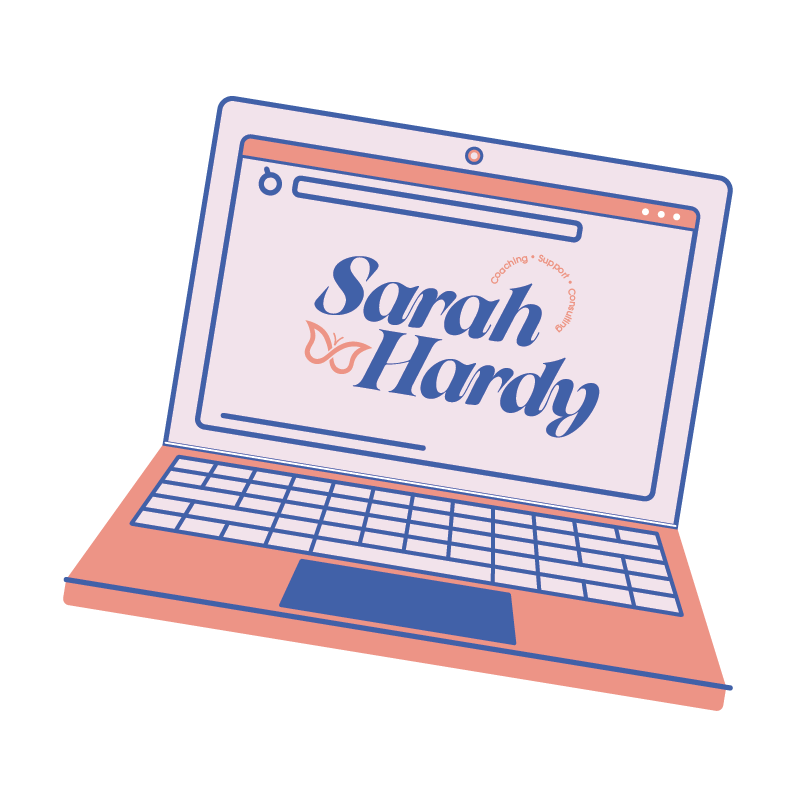Why Mental Health Can Look Different for Neurodivergent People
- Sarah Hardy
- May 5
- 8 min read
Updated: May 7
You’ve probably heard the phrase “it’s okay to not be okay.” But what if your version of “not okay” has never looked like anyone else’s?
If you’re Autistic, ADHD, or otherwise neurodivergent especially if you’re late diagnosed or self-discovered, you might not even realise just how much you’ve been masking, adapting, and pushing through.
And when the world’s view of mental health doesn’t include your experience, it’s easy to feel invisible.
This post is for you.
What Even Is Mental Health for Neurodivergent People?
Most mental health messaging assumes a neurotypical baseline.
But if your brain already works differently, if you experience the world through a different sensory, emotional, or cognitive lens, then the signs of mental health crisis might not show up in “typical” ways.
For example, mental health struggles might look like:
Total shutdown instead of crying
Rage, irritability, or snapping instead of low mood
Looping thoughts instead of clear anxiety
Avoiding messages or canceling plans instead of “talking to someone”
Masking so well that even you don’t realise how much you’re struggling
If you’re late- or self-discovered, you may not even have had the language to explain this for most of your life.
So you push through. You cope.Until one day—you can’t.
Burnout Isn’t the Same for Everyone
Autistic burnout. ADHD burnout.They’re not buzzwords. They’re real. And they’re often misunderstood even by professionals.
Autistic burnout can build silently over time. You might appear functional, even successful, on the outside. But inside? You’re completely depleted.
Signs of neurodivergent burnout might include:
Losing access to words or emotional regulation
Feeling like even small tasks are impossible
Struggling with hygiene, food, or sleep
Becoming hypersensitive or totally numb
Losing your ability to mask (or realising you were masking at all)
This isn’t “just stress.” It’s a full-body, full-brain shutdown. And most people don’t see it coming—because you’ve coped for so long.
Monotropism, Overload & The “Too Muchness” of Everything
Monotropism is the theory that many Autistic people focus intensely on one thing at a time. This means that switching, multitasking, and external demands can feel deeply stressful.
Mental health struggles can arise not from “big events,” but from the constant pressure of being pulled in too many directions at once.
If you’ve ever felt:
Like your thoughts are stuck on a loop
Like your focus is being “torn” from something important
Like you’re emotionally exhausted from just navigating people…
This could be neurodivergent stress in action.
Double Empathy & Why Support Can Feel So Hard to Access
The double empathy problem is the idea that the breakdown in communication between Autistic and non-Autistic people goes both ways.
So when you try to explain your experience, and the person doesn’t get it, or worse,dismisses it, it can reinforce shame, mistrust, and isolation.
For self-discovered neurodivergent adults, this might sound like:
“You’ve always managed before.”
“It’s just parenting/work/stress, everyone struggles.”
“You’re just too sensitive.”
But it’s not just the struggle—it’s the loneliness of not being understood.
What Mental Health Messaging Misses
Mental health awareness often says:
“Talk to someone.”
“Reach out.”
“Take time for yourself.”
But what if:
You’ve never felt comfortable reaching out?
You don’t have the language to explain how you feel?
“Time for yourself” means a whole other kind of pressure and guilt?
It’s not that the advice is wrong. It’s that it’s incomplete for people with differently wired brains.
So What Does Help?
For many neurodivergent people, support needs to be:
✔ Gentle, not overwhelming
✔ Flexible, not prescriptive
✔ Understanding, not assuming
✔ Collaborative, not directive
✔ Built on trust, not judgment
You need space to unpack not just the stress, but the whole story underneath. The masking. The burnout. The shame. The missed connections.
And that space doesn’t always exist in traditional systems.
You’re Not “Too Much.”
You’ve Just Carried Too Much for Too Long.
If your version of struggle doesn’t look like the one everyone recognises please know, it still counts.
If you’ve been holding it all together because asking for help feels harder than pushing through—I see you.
You don’t need to fall apart to deserve support. You don’t need to explain it perfectly to be taken seriously. And you’re not weak because you’re tired.
You’re just human. A neurodivergent one. And your needs matter too.
Want to Keep Exploring?
Each week during May leading up to Mental Health Awareness week - Mon, 12 May 2025 – Sun, 18 May 2025, I’ll be sharing more posts like this written for late/self-discovered ADHDers, Autistic adults, and anyone navigating big emotions, business, burnout and beyond.

🛑 A Gentle Note on Mental Health & Coaching Support
While coaching can be a powerful and therapeutic space, it isn’t a substitute for mental health crisis support or clinical care.
If you’re currently experiencing an active mental health crisis—feeling unsafe, overwhelmed, or like things are too much to manage—please know that you don’t have to go through it alone. Coaching may not be the right support in those moments, and it’s important to speak to someone trained to help.
I know (first-hand) that reaching out to a GP can sometimes feel like a mountain to climb—especially if you're already navigating Rejection Sensitivity, communication barriers, or long waits just to get through reception. But help is still available.
There are free, confidential services that don’t require appointments, long explanations, or phone calls—because I understand how hard even that can feel.
📱 Text Support (UK-based):Shout offers free, 24/7 mental health support via text.Just text SHOUT to 85258 to speak with a trained volunteer.Confidential. No pressure. No speaking required.
📞 Call Support:Samaritans are available 24/7, free of charge. Call 116 123 to talk to someone completely confidentially.They’ll listen without judgement—whatever you’re going through.
If you’re in immediate danger or need urgent help, please call 999 or visit A&E.
You are not a burden. You matter. And you deserve the right kind of support—whatever that looks like for you today.
FAQs: Neurodivergent Mental Health
Why does mental health look different for neurodivergent people?
Because ADHD, Autism, and other neurodivergent experiences affect how we process the world—sensory input, emotions, routines, and communication. This means signs of distress, burnout, or shutdown may show up in ways that aren’t always recognised by typical mental health frameworks.
What are the signs of burnout in ADHD or Autism?
Burnout might look like total shutdown, extreme fatigue, irritability, difficulty with speech or thinking clearly, or avoiding even basic tasks. For many neurodivergent adults, it’s not about being “tired”—it’s about hitting a full system overload, especially after prolonged masking or emotional labour.
What is masking and how does it affect mental health?
Masking is when you suppress or hide your natural traits to appear more “normal” or fit in. It can include copying social behaviours, scripting conversations, or pretending you’re okay when you’re not. Over time, this creates chronic stress and disconnection from your authentic self, contributing to burnout, anxiety, and depression.
What is monotropism and how does it relate to stress?
Monotropism is a theory of Autistic experience that suggests many Autistic people focus deeply on one thing at a time. Being interrupted, expected to switch tasks, or pulled in too many directions can cause emotional distress and overwhelm—something often mistaken for mood or behaviour issues.
What is the double empathy problem?
The double empathy problem suggests that communication breakdowns between Autistic and non-Autistic people go both ways—not just because the Autistic person struggles to relate. It explains why neurodivergent people often feel misunderstood and why support systems need to adapt, not just individuals.
Can coaching help with mental health if I’m not in crisis?
Yes. You don’t have to wait until you’re “at breaking point” to get support. Coaching can be a therapeutic, proactive space to understand yourself, reduce overwhelm, and find what actually works for your brain—especially if traditional mental health support hasn’t quite fit.
What if I don’t have a formal diagnosis?
You don’t need a diagnosis to validate your experience. Many people are self-discovered later in life, especially women and non-binary individuals who were missed by earlier diagnostic models. If you resonate with the content and want support, that’s more than enough to get started.
Further Reading & Resources
Here are some of the people and theories referenced in this post:
Dr. Chloe Farahar – An Autistic academic regularly writes about the harms of pathologising neurodivergent experiences. Explore more of their work at Aucademy
Monotropism – A theory of Autistic experience developed by Dinah Murray, Wenn Lawson, and Mike Lesser. Read more at Monotropism.org and in academic writing such as:
Murray, D., Lesser, M., & Lawson, W. (2005). Attention, monotropism and the diagnostic criteria for autism. Autism, 9(2), 136–156.
The Double Empathy Problem –"In simple terms, the ‘double empathy problem’ refers to a breakdown in mutual understanding (that can happen between any two people) and hence a problem for both parties to contend with, yet more likely to occur when people of very differing dispositions attempt to interact. Within the context of exchanges between autistic and non-autistic people however, the locus of the problem has traditionally been seen to reside in the brain of the autistic person. This results in autism being primarily framed in terms of a social communication disorder, rather than interaction between autistic and non-autistic people as a primarily mutual and interpersonal issue." Learn more here.
These voices and frameworks have deeply influenced how we understand neurodivergent mental health, and I recommend exploring their work if any part of this post resonated with you.
A Note on Perspective, Experience and Understanding:
While I always aim to share well-informed, respectful, and research-backed content, everything I write comes from my own experience, lens, and learning.
I don’t claim to speak for the whole neurodivergent community, and I don’t believe there’s only one valid way to experience ADHD, Autism, or mental health.
Please take from this what resonates, and feel free to leave what doesn’t.
Your journey might look entirely different to mine—and that’s okay.
I’m always learning, and the language I use throughout my blogs may evolve as I discover more. I’m open to discussing the content of my work and making updates when needed.
About Me: I’m Sarah, a white, British woman in my late thirties.
I was late diagnosed with ADHD at 35, and I’m currently exploring a likely self-discovery of Autism. I’m a mum of two, with a background in psychology, counselling, coaching and business support.
I hold a degree in Psychology, Psychotherapy & Counselling, and I’m currently completing a Master’s in Positive Psychology and Coaching Psychology.
My research focuses on how coaching supports neurodivergent people, and how that experience may differ from neurotypical coaching frameworks.
I coach all people but have a special interest in working with neurodivergent adults—especially those who were diagnosed or self-discovered later in life—and my goal is always to offer support that’s practical, affirming, and shame-free.
A Note on Perspective, Experience and Understanding:
While I always aim to share well-informed, respectful, and research-backed content, everything I write comes from my own experience, lens, and learning.
I don’t claim to speak for the whole neurodivergent community, and I don’t believe there’s only one valid way to experience ADHD, Autism, or mental health.
Please take from this what resonates, and feel free to leave what doesn’t.
Your journey might look entirely different to mine—and that’s okay.
I’m always learning, and the language I use throughout my blogs may evolve as I discover more. I’m open to discussing the content of my work and making updates when needed.
About Me: I’m Sarah, a white, British woman in my late thirties.
I was late diagnosed with ADHD at 35, and I’m currently exploring a likely self-discovery of Autism. I’m a mum of two, with a background in psychology, counselling, coaching and business support.
I hold a degree in Psychology, Psychotherapy & Counselling, and I’m currently completing a Master’s in Positive Psychology and Coaching Psychology.
My research focuses on how coaching supports neurodivergent people, and how that experience may differ from neurotypical coaching frameworks.
I coach all people but have a special interest in working with neurodivergent adults—especially those who were diagnosed or self-discovered later in life—and my goal is always to offer support that’s practical, affirming, and shame-free.




Comments